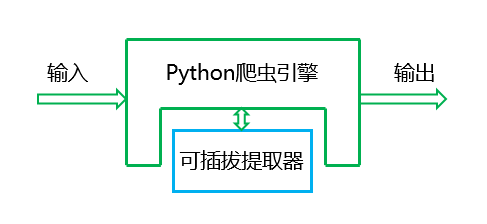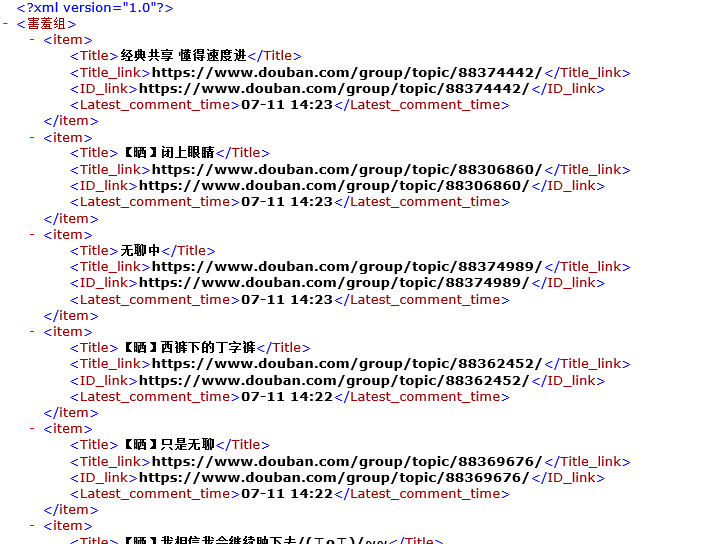Home >Backend Development >Python Tutorial >Python instant web crawler project: definition of content extractor
Python instant web crawler project: definition of content extractor
- 高洛峰Original
- 2016-11-22 16:02:241299browse
1. 项目背景
在Python即时网络爬虫项目启动说明中我们讨论一个数字:程序员浪费在调测内容提取规则上的时间太多了(见上图),从而我们发起了这个项目,把程序员从繁琐的调测规则中解放出来,投入到更高端的数据处理工作中。
这个项目推出以后受到很大关注,因为开放源码,大家可以在现成源码基础上进一步开发。然而,Python3和Python2是有区别的,《Python即时网络爬虫项目: 内容提取器的定义》 一文的源码无法在Python2.7下使用,本文将发布一个Python2.7的内容提取器。
2. 解决方案
为了解决这个问题,我们把影响通用性和工作效率的提取器隔离出来,描述了如下的数据处理流程图:

图中“可插拔提取器”必须很强的模块化,那么关键的接口有:
标准化的输入:以标准的HTML DOM对象为输入
标准化的内容提取:使用标准的xslt模板提取网页内容
标准化的输出:以标准的XML格式输出从网页上提取到的内容
明确的提取器插拔接口:提取器是一个明确定义的类,通过类方法与爬虫引擎模块交互
3. 提取器代码
可插拔提取器是即时网络爬虫项目的核心组件,定义成一个类: GsExtractor 适用python2.7的源代码文件及其说明文档请从 github 下载
使用模式是这样的:
实例化一个GsExtractor对象
为这个对象设定xslt提取器,相当于把这个对象配置好(使用三类setXXX()方法)
把html dom输入给它,就能获得xml输出(使用extract()方法)
下面是这个GsExtractor类的源代码(适用于Python2.7)
#!/usr/bin/python
# -*- coding: utf-8 -*-
# 模块名: gooseeker_py2
# 类名: GsExtractor
# Version: 2.0
# 适配Python版本: 2.7
# 说明: html内容提取器
# 功能: 使用xslt作为模板,快速提取HTML DOM中的内容。
# released by 集搜客(http://www.gooseeker.com) on May 18, 2016
# github: https://github.com/FullerHua/jisou/core/gooseeker_py2.py
from urllib2 import urlopen
from urllib import quote
from lxml import etree
import time
class GsExtractor(object):
def _init_(self):
self.xslt = ""
# 从文件读取xslt
def setXsltFromFile(self , xsltFilePath):
file = open(xsltFilePath , 'r')
try:
self.xslt = file.read()
finally:
file.close()
# 从字符串获得xslt
def setXsltFromMem(self , xsltStr):
self.xslt = xsltStr
# 通过GooSeeker API接口获得xslt
def setXsltFromAPI(self , APIKey , theme, middle=None, bname=None):
apiurl = "http://www.gooseeker.com/api/getextractor?key="+ APIKey +"&theme="+quote(theme)
if (middle):
apiurl = apiurl + "&middle="+quote(middle)
if (bname):
apiurl = apiurl + "&bname="+quote(bname)
apiconn = urlopen(apiurl)
self.xslt = apiconn.read()
# 返回当前xslt
def getXslt(self):
return self.xslt
# 提取方法,入参是一个HTML DOM对象,返回是提取结果
def extract(self , html):
xslt_root = etree.XML(self.xslt)
transform = etree.XSLT(xslt_root)
result_tree = transform(html)
return result_tree4. 用法示例
下面是一个示例程序,演示怎样使用GsExtractor类提取豆瓣讨论组话题。本示例有如下特征:
提取器的内容通过GooSeeker平台上的api获得
保存结果文件到当前文件夹
下面是源代码,都可从 github 下载
# _*_coding:utf8_*_
# douban_py2.py
# 爬取豆瓣小组讨论话题
# Python版本: 2.7
from lxml import etree
from gooseeker_py2 import GsExtractor
from selenium import webdriver
import time
class PhantomSpider:
def getContent(self, url):
browser = webdriver.PhantomJS(executable_path='C:\\phantomjs-2.1.1-windows\\bin\\phantomjs.exe')
browser.get(url)
time.sleep(3)
html = browser.execute_script("return document.documentElement.outerHTML")
output = etree.HTML(html)
return output
def saveContent(self, filepath, content):
file_obj = open(filepath, 'w')
file_obj.write(content)
file_obj.close()
doubanExtra = GsExtractor()
# 下面这句调用gooseeker的api来设置xslt抓取规则
# 第一个参数是app key,请到GooSeeker会员中心申请
# 第二个参数是规则名,是通过GooSeeker的图形化工具: 谋数台MS 来生成的
doubanExtra.setXsltFromAPI("ffd5273e213036d812ea298922e2627b" , "豆瓣小组讨论话题")
url = "https://www.douban.com/group/haixiuzu/discussion?start="
totalpages = 5
doubanSpider = PhantomSpider()
print("爬取开始")
for pagenumber in range(1 , totalpages):
currenturl = url + str((pagenumber-1)*25)
print("正在爬取", currenturl)
content = doubanSpider.getContent(currenturl)
outputxml = doubanExtra.extract(content)
outputfile = "result" + str(pagenumber) +".xml"
doubanSpider.saveContent(outputfile , str(outputxml))
print("爬取结束")提取结果如下图所示:

本文已经说明了提取器的价值和用法,但是没有说怎样生成它,只有快速生成提取器才能达到节省开发者时间的目的

